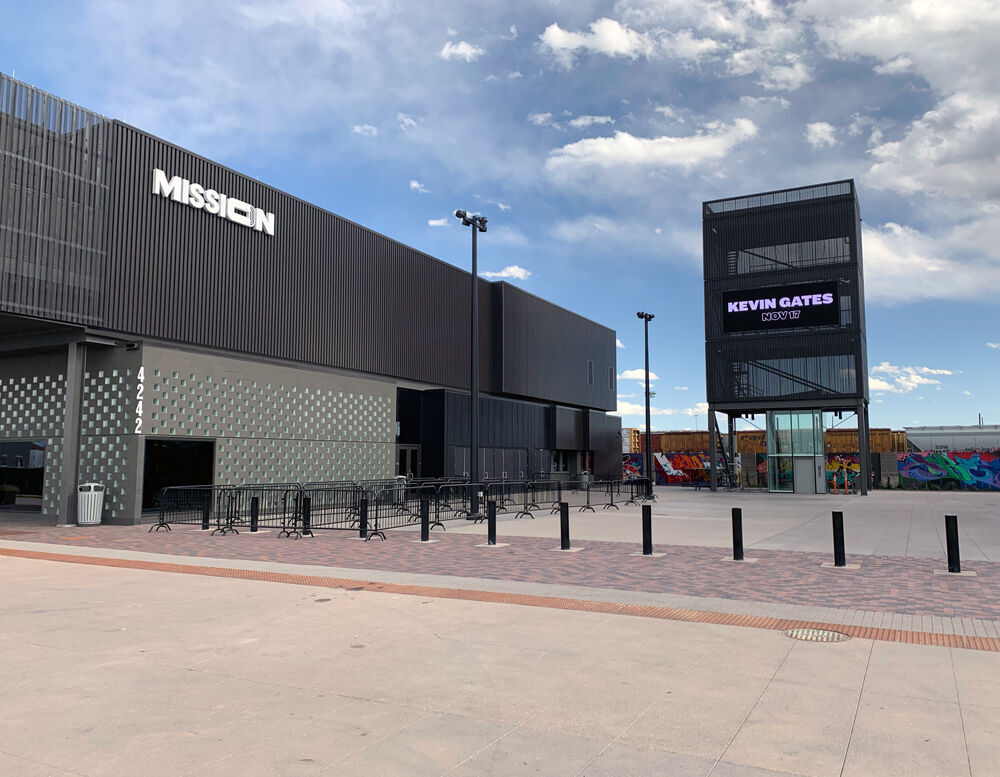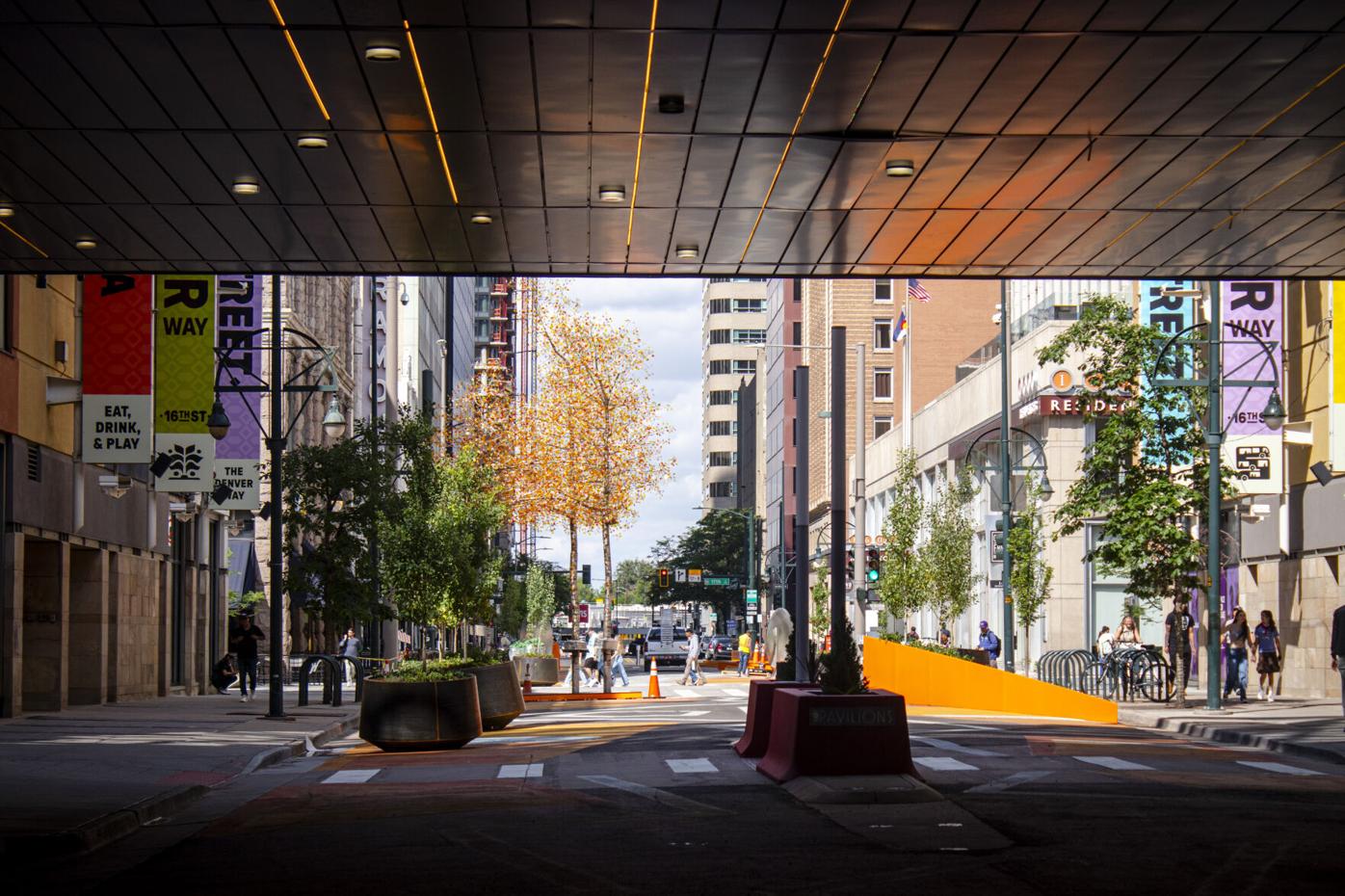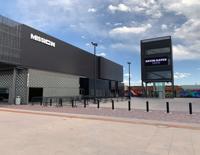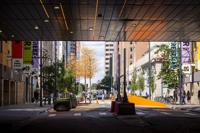Mission Ballroom plaza applies to become Denver’s first alcohol-friendly ‘entertainment district’
As Denver’s pilot program to allow the creation of public drinking zones is nearing the end of its five-year period, the city has finally received its first application.
The owner of Mission Ballroom and the building home to Left Hand Brewery and Chubby Unicorn Cantina applied to create an “entertainment district” with a common consumption license, according to the city’s excise and licenses department.

FILE PHOTO: The plaza outside Denver's Mission Ballroom. The owner of Mission Ballroom and the building home to Left Hand Brewery and Chubby Unicorn Cantina applied to create an “entertainment district” with a common consumption license.
Itsbydesign (Creative Commons).

FILE PHOTO: The plaza outside Denver’s Mission Ballroom. The owner of Mission Ballroom and the building home to Left Hand Brewery and Chubby Unicorn Cantina applied to create an “entertainment district” with a common consumption license.
It’s the first application the city received for the program established in 2021, the department said.
The drinking area would include the outdoor plaza outside of Mission Ballroom in the River North Arts District on 4180 Wynkoop St. The area is owned by Westfield Company Inc., the same owner of Stanley Marketplace in Aurora (which is already a common consumption area).
The common consumption area will be anchored by Left Hand Brewery and Chubby Unicorn Cantina, who have the necessary liquor licenses needed to form a promotional association that would allow people that buy alcoholic beverages to walk around the plaza, once the district is formed.
The application still needs to be approved by City Council before establishing the entertainment district.
Once the city approves an entertainment district, there can be several common consumption areas created within the area.
The application includes Mission Ballroom within the entertainment district, said Westfield’s Special Projects Manager Ally Fredeen, but only the plaza would be allowed for common consumption.
People would not be allowed to buy drinks inside the concert venue and leave the building, she said.
Instead, it allows for people waiting to get into a show, camping out for merchandise or seats and those leaving a concert to be in the area with a drink from one of the nearby businesses.
She added it would also include the Peach Crease Club, a new cocktail lounge set to open later this year.
“It will allow each liquor license establishment to have their patrons take drinks out onto the shared plaza and hang out, whether it be before a concert, after a concert or no concert,” Fredeen said.
Last chance for the soon-ending pilot program?
The city isn’t quite sure why property owners haven’t tried out Denver’s new allowance over the past four years, but suspects the pilot program’s implementation during the pandemic may have been bad timing, said the licensing department’s spokesperson Eric Escudero.
“Many businesses were in survival mode right after the pandemic, without the staff or resources to create a new area outside of their business for a common consumption area,” Escudero said.
The agency who runs the program hopes this application can help pave the way for other businesses to follow, he added.
“But with a first applicant, and the possible creation of the first entertainment district where multiple common consumption areas can be created,” Escudero said, “this could be the first action that could lead to a snowball effect of more applications for common consumption coming in the future.”

FILE PHOTO: Glenarm Plaza and 16th Street in Downtown Denver on May 29, 2025.
Bernadette Berdychowski / The Denver Gazette

FILE PHOTO: Glenarm Plaza and 16th Street in Downtown Denver on May 29, 2025.
The program is a separate license from the newly-created zone for drinking alcohol outside on Glenarm Plaza, a block of 16th Street in Upper Downtown.
Denver set up a “city-established consumption area” in late May in front of the Denver Pavilions, which has stricter restrictions such as businesses needing the state’s liquor license for take-out drinks and not allowing people to bring their alcoholic beverages to adjacent businesses that aren’t eligible.
Meanwhile, common consumption areas are primarily designed for private properties.
The city’s pilot program expires on June 1, 2026, but it could be extended.
The Excise and Licenses Department is considering asking Denver City Council for permission to extend the common consumption program, Escudero said.
If the entertainment district in RiNo is approved, its common consumption license would run for a year from the date of approval.
The application hopes to bring new energy into RiNo and the plaza, which is “underutilized,” Fredeen said.
It won’t be full Bourbon Street, she added. There will be tight security in the plaza, per city guidelines. And the pilot program requires alcohol to be served in special cups clearly featuring vendor names.
“It’ll be very controlled,” Fredeen said. “But what a beautiful way to bring people together.”
Get OutThere
Signup today for free and be the first to get notified on new updates.






